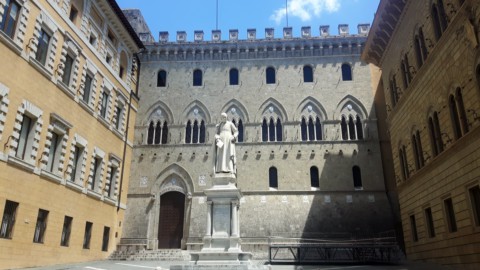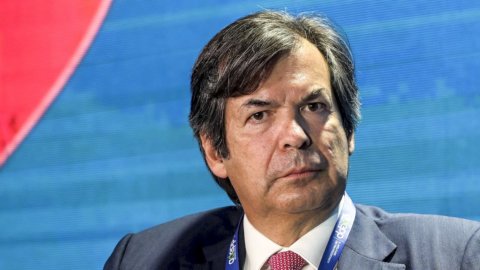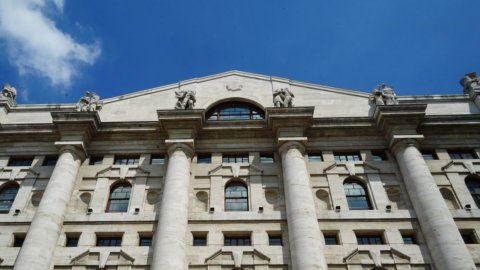The American health authorities strongly urge citizens not to visit the United Kingdom, which sadly celebrated "freedom day" from Covid-19 yesterday, despite Prime Minister Boris Johnson self-isolating. In Tokyo, the Olympics have lost a sponsor of the caliber of Toyota: the symbol of the Rising Sun industry does not want to be associated with an event which, for now, has emptied the cities. These are just two of the many examples of the emergency imposed by the Delta variant, which has now liquidated the hope of a V-shaped recovery of the economies. And this explains the return of the Bear on all markets: from Europe, which has exceeded 50 million infections, to Asia, where the rain of sales is still raging.
The MSCI Asia Pacific ex-Japan stock index fell 0,3%. Japan's Nikkei 225 loses 0,7% and hits a six-month low. Hang Seng Index -1%; the Chinese benchmark index CSI300 closes at -0,7%.
Beijing kept its benchmark lending rate unchanged for loans to businesses and households, despite growing market expectations of a cut.
DOWN THE DOW JONES, AFTER THE ACCOUNTS IBM BOUNCES
Even Wall Street has paid a heavy price for the advance of the Delta variant. But once again the US lists proved to be more robust than those of the Eurozone: the Dow Jones (-2,1%) recorded the worst session in nine months. S&P500 -1,6%. The Nasdaq is more resistant (-1,1%).
Shines after the IBM Stock Exchange (+3%) on the wave of cloud performance.
THE T-BOND AT THE LOWEST SINCE FEBRUARY, BUND AT -0,36%
The flight from bond market risk continues: the 1,19-year T-bond slips below 2%, to its lowest since February. The 0,22-year yield edged up slightly to 0,21% from 10%. However, while the US yield curve steepened slightly, the spread between the 2-year and XNUMX-year yield remained close to its February lows, signaling investors' doubts about the growth outlook.
A similar reaction hit the German Bund, yielding -0,39% and the British Gilt trading at 0,56%.
OIL COLLAPSES, BRENT AT 68 DOLLARS
Oil prices tumbled more than 6%, driven lower by both concerns about future demand and the OPEC+ deal struck over the weekend to boost supply. Brent and Wti are up slightly this morning.
There are also sales on cryptocurrencies. In the early stages of the day, Bitcoin fell by 4% and fell below the $30 threshold.
Gold is back above $1.800, at $1.817 an ounce this morning, after falling to a one-week low at $1.794.
European stock markets are heading towards an opening just above parity after the most difficult session of the year.
BUSINESS SQUARE AT THE LOWEST SINCE MARCH
Piazza Affari (-3,34%) even plunged below 24 points, to 23.965, marking the lowest since last March.
In this context, all of Europe falls back: Frankfurt -2,69%; Paris -2,54%; Amsterdam -2,1%; Madrid -2,4%.
ACKMAN BLITZ, VIVENDI MISSES
Vivendi loses ground (-1,54%) after billionaire Bill Ackman entered Universal with 10% through one of his hedge funds and not with a SPAC. Down the Big of the lisso: Lvmh -2,2%, Kering -2,7%.
Even London (-2,32%) lives with a certain melancholy the day of the total reopening, with the mockery of Boris Johnson in quarantine and the threshold of 50 thousand daily infections now one step away.
CRUISES, PLANES AND BIG OIL COLLAPSE
To make matters worse, the British government said on Friday it would backtrack on easing quarantine rules for travelers arriving from France.
Stocks under fire include cruise operator Carnival, airline EasyJet and British Airways parent IAG, with losses approaching 5%. Oil giants BP and Royal Dutch Shell were also very weak.
ONLY VIDEO GAMES ARE SAVED: SUMO +40%
Among the few that bucked the trend, the British video game company Sumo Group should be noted, which jumped 40% after the Chinese tech giant Tencent bought the group for 919 million pounds.
BUNDS ARE RUNNING, SPREAD GOES UP
At the end of the session, the Italian secondary reduced the losses accumulated previously, in parallel with the improvement in the US and German charts.
Fears about the spread of the Delta variant of Covid and an increase in cases make investors more cautious, deflating the yields of Treasuries, to five-month lows, and those of Bunds and instead penalizing the Italian paper.
The reference ten-year Italian rate fell below the threshold of 0,70%, to its lowest level since the beginning of April, and then recovered slightly.
The Italy-Germany spread widened to 110 basis points, its highest since July 8, from 107 at Friday's close, while the 0,39-year Bund yield fell to a new low since mid-February at -XNUMX%.
TIM CUTS EBITDA ESTIMATIONS. LANDSLIDE WEBUILD
Tim's retreat is broadcast in Piazza Affari (-4,15%), which has slipped to its lowest since February after the company revised its Ebitda estimates for 2021 downwards to a "low to mid single digit" drop from " stable to low single digit growth” following the agreement with Dazn for the distribution of the Serie A championship. Banca Akros sees the announcement as negative “as a profit warning can be”.
WeBuild also dropped sharply (-6,2%): the market considers credible the rumors of an imminent exit from the capital of Cassa Depositi e Prestiti Sheet.
OIL IN FLAMES, ENI -3,8%
Even more massive were the sales on Maire Tecnimont (-7,46%) the most sacrificed of the stocks linked to the energy sector. Saipem sells 4,45%, Snam 2,53% and Saras 2,03%.
Eni -3,8% despite Morgan Stanley's decision to raise the target price from 12,3 to 13,3 euros.
All the utility sector sold, affected by the publication of the first consultation document of the WACC for the new regulatory period 2022-2027 by the Energy Authority which shows a cut in yields below expectations for activities regulated with a negative impact on EPS. The greatest impacts are expected for Snam, Terna and Italgas which lose respectively 2,5%, 2,7% and 3,3%.
Enel (-5,07%) detached the coupon, with payment on July 21st.
BPER LEADS THE BANKS' RETREAT
Heavy banks, particularly affected by the letter. The big Unicredit and Intesa yield respectively 4,1% and 3,9%. Bper was also bad, down by about 5%, also penalized by Kepler Cheuvreux, who cut the target price to 1,9 euros from 2,1 euros. Banco Bpm leaves 3,46% on the ground, Mediobanca -3%.
DOWN THE CAR, LUXURY ALSO SUFFERS
The automotive sector was also down sharply: Stellantis -5%, Exor -4,75%.
Sales also hit the luxury sector, despite the day full of news: from the acquisition of the majority stake in Etro by L Catterton Europe, the fund owned by the Arnault family, up to the listing announcement of Zegna in New York through the merger with Spac promoted by Sergio Ermotti and Andrea Bonomi. Moncler drops by 1,2%, Ferragamo by 2,89% and Cucinelli by 1,81%.
ONLY DIASORIN RISES, JUVENTUS TOWARDS INCREASE
Diasorin goes against the trend (+1,84%). The stock, recently rewarded by the buy of Banca Akros and Kepler, benefits from rumors about the introduction of new restrictions and the application of the Green Pass, which will encourage the use of swabs to detect the presence of the virus.
Juventus proceeds towards the 400 million capital increase planned for the autumn. The banking consortium consisting of Unicredit, JP Morgan, Goldman Sachs and Mediobanca has already been established. On the Aim, it is worth mentioning CrowdFundme (-1,3%), which started the placement of the minibond of Ellemme, a company specializing in Real Estate transactions. The bond offers an annual yield of 6% and has an amortized repayment plan (interest will be paid with a semi-annual coupon in arrears) for a total duration of the transaction equal to 60 months.





